 |
|---|
This is a list of Sejm Marshals , or Speakers of the Sejm (the Lower house of the Polish Parliament) since its establishment as a regular convening body in the late 15th century, until now. [1] [2]
 |
|---|
This is a list of Sejm Marshals , or Speakers of the Sejm (the Lower house of the Polish Parliament) since its establishment as a regular convening body in the late 15th century, until now. [1] [2]
| No | Name | Period |
|---|---|---|
| 1 | Jan Sierakowski | October 31, 1548 – December 12, 1548 |
| 2 | Mikołaj Sienicki | May 15, 1550 – July 26, 1550 |
| 3 | Rafał Leszczyński | February 2, 1552 – April 11, 1552 |
| 4 | Mikołaj Sienicki | February 1, 1553 – February 2, 1559 |
| 5 | Rafał Leszczyński | November 30, 1562 – March 25, 1563 |
| 6 | Mikołaj Sienicki | November 22, 1563 – April 14, 1565 |
| 7 | Stanisław Sędziwój Czarnkowski [3] | January 10, 1569 – August 12, 1569 |
| No | Name | Period |
|---|---|---|
| 1 | Tomasz Adam Ostrowski | |
| 2 | Stanisław Sołtyk | |
| 3 | Adam Kazimierz Czartoryski | |
| No | Name | Period |
|---|---|---|
| 1 | Wincenty Krasiński | |
| 2 | Rajmund Rembieliński | |
| 3 | Stanisław Piwnicki [3] [4] | |
| 4 | Józef Lubowidzki [3] [4] | May 1830 - November 1830 [5] |
| 5 | Władysław Ostrowski | November 1830- |
| No | Name | Sejm | Period |
|---|---|---|---|
| 1 | Leon Sapieha | I II III | 1861–1875 |
| 2 | Alfred Józef Potocki | III | 1875 |
| 3 | Włodzimierz Dzieduszycki | III | 1876 |
| 4 | Ludwik Wodzicki [4] | IV | 1877-80 |
| 5 | Mikołaj Zyblikiewicz | IV V | 1881-86 |
| 6 | Jan Dzierżysław Tarnowski | V VI | 1886-90 |
| 7 | Eustachy Stanisław Sanguszko | VI | 1890-95 |
| 8 | Stanisław Marcin Badeni [4] | VII | 1895-1901 |
| 9 | Andrzej Potocki [4] | VIII | 1901-02 |
| (8) | Stanisław Marcin Badeni | VIII IX | 1903-12 |
| 10 | Adam Gołuchowski | X | 1913-14 |
| 11 | Stanisław Niezabitowski | X | 1914-18 |
| No | Name | Sejm | Period | Party |
|---|---|---|---|---|
| 1 | Wojciech Trąmpczyński | Legislative Sejm | February 14, 1919 – November 27, 1922 | |
| 2 | Maciej Rataj | I | November 28, 1922 – March 26, 1928 | Polish People's Party "Piast" |
| 3 | Ignacy Daszyński | II | March 27, 1928 – December 8, 1930 | Polish Socialist Party |
| 4 | Kazimierz Świtalski | III | December 9, 1930 – October 3, 1935 | Nonpartisan Bloc for Cooperation with the Government |
| 5 | Stanisław Car | IV | October 4, 1935 – June 18, 1938 | Nonpartisan Bloc for Cooperation with the Government/Camp of National Unity |
| 6 | Walery Sławek | IV | June 22, 1938 – November 27, 1938 | Nonpartisan Bloc for Cooperation with the Government |
| 7 | Wacław Makowski | V | November 28, 1938 – November 2, 1939 | Camp of National Unity |
| No | Name | Sejm | Period | Party | |
|---|---|---|---|---|---|
| 1 | Władysław Kowalski | Legislative Sejm | February 4, 1947 – November 19, 1952 | United People's Party (Poland) | |
| 2 | Jan Dembowski | I | November 20, 1952 – February 19, 1957 | United People's Party (Poland) | |
| 3 | Czesław Wycech | II III IIV V | February 20, 1957 – February 11, 1971 | United People's Party (Poland) | |
| 4 | Dyzma Gałaj | V | February 11, 1971 – March 27, 1972 | United People's Party (Poland) | |
| 5 | Stanisław Gucwa | VI VII VIII | March 28, 1972 – November 5, 1985 | United People's Party (Poland) | |
| 6 | Roman Malinowski | IX | November 6, 1985 – June 22, 1989 | United People's Party (Poland) | |
| 7 | Mikołaj Kozakiewicz | X | July 4, 1989 – December 31, 1989 | United People's Party (Poland) | |
| No | Name | Portrait | District | Sejm | Period | Party | |
|---|---|---|---|---|---|---|---|
| 1 | Mikołaj Kozakiewicz |  | National list | X | December 31, 1989 – November 24, 1991 | United People's Party/Polish People's Party - Revival/Polish People's Party | |
| 2 | Wiesław Chrzanowski |  | 28 Lubelskie | I | November 25, 1991 – October 14, 1993 | Christian National Union | |
| 3 | Józef Oleksy |  | 39 Siedleckie | II | October 14, 1993 – March 3, 1995 | Democratic Left Alliance | |
| 4 | Józef Zych |  | 52 Zielonogórskie | II | March 3, 1995 – October 19, 1997 | Polish People's Party | |
| 5 | Maciej Płażyński |  | 11 Gdańskie | III | October 20, 1997 – October 18, 2001 | Solidarity Electoral Action | |
| 6 | Marek Borowski |  | 19 Mazowieckie | IV | October 19, 2001 – April 20, 2004 | Democratic Left Alliance/Social Democracy of Poland | |
| (3) | Józef Oleksy |  | 18 Mazowieckie | IV | April 21, 2004 – January 5, 2005 | Democratic Left Alliance | |
| 7 | Włodzimierz Cimoszewicz |  | 24 Podlaskie | IV | January 5, 2005 – October 18, 2005 | Democratic Left Alliance | |
| 8 | Marek Jurek |  | 10 Łódzkie | V | October 26, 2005 – April 27, 2007 | Law and Justice/Right Wing of the Republic | |
| 9 | Ludwik Dorn |  | 20 Mazowieckie | V | April 27, 2007 – November 4, 2007 | Law and Justice | |
| 10 | Bronisław Komorowski |  | 20 Mazowieckie | VI | November 5, 2007 – July 8, 2010 | Civic Platform | |
| – | acting Stefan Niesiołowski |  | 8 Lubuskie | VI | July 8, 2010 | Civic Platform | |
| 11 | Grzegorz Schetyna |  | 1 Dolnośląskie | VII | July 8, 2010 – November 8, 2011 | Civic Platform | |
| 12 | Ewa Kopacz |  | 17 Mazowieckie | VII | November 8, 2011 – September 22, 2014 | Civic Platform | |
| – | acting Jerzy Wenderlich |  | 5 Kujawsko-pomorskie | VII | September 22, 2014 – September 24, 2014 | Democratic Left Alliance | |
| 13 | Radosław Sikorski |  | 4 Kujawsko-pomorskie | VII | September 24, 2014 – June 23, 2015 | Civic Platform | |
| – | acting Jerzy Wenderlich |  | 5 Kujawsko-pomorskie | VII | June 23–25, 2015 | Democratic Left Alliance | |
| 14 | Małgorzata Kidawa-Błońska |  | 19 Mazowieckie | VII | June 25, 2015 - November 11, 2015 | Civic Platform | |
| 15 | Marek Kuchciński |  | 22 Podkarpackie | VIII | November 12, 2015 - August 9, 2019 | Law and Justice | |
| 16 | Elżbieta Witek |  | 1 Dolnośląskie | VIII IX | August 9, 2019 - November 12, 2023 | Law and Justice | |
| 17 | Szymon Hołownia |  | 24 Podlaskie | X | November 13, 2023-present | Poland 2050 | |

The Sejm, officially known as the Sejm of the Republic of Poland, is the lower house of the bicameral parliament of Poland.
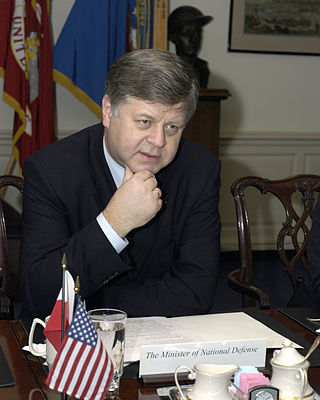
Jerzy Andrzej Szmajdziński was a Polish politician who was a Deputy Marshal of Polish Sejm and previously served as Minister of Defence. He was a candidate for President of Poland in the 2010 election.

The Great Sejm, also known as the Four-Year Sejm was a Sejm (parliament) of the Polish–Lithuanian Commonwealth that was held in Warsaw between 1788 and 1792. Its principal aim became to restore sovereignty to, and reform, the Commonwealth politically and economically.
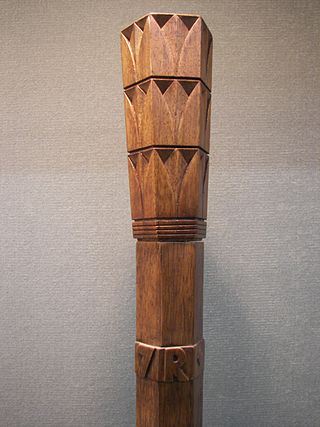
The Marshal of the Sejm is the speaker (chair) of the Sejm, the lower house of the Polish Parliament. The office traces its origins to the 15th century. In modern Poland, the full title is Marshal of the Sejm of the Republic of Poland.

Marszałek was the title of one of the highest officials in the Polish royal court since the 13th century, and in the Grand Duchy of Lithuania since the 15th century. It was the highest-ranking of all court officials and was considered the most important advisor to the King of Poland.

The parliament of Poland is the bicameral legislature of Poland. It is composed of an upper house and a lower house. Both houses are accommodated in the Sejm and Senate Complex in Warsaw. The Constitution of Poland does not refer to the Parliament as a body, but only to the Sejm and Senate.
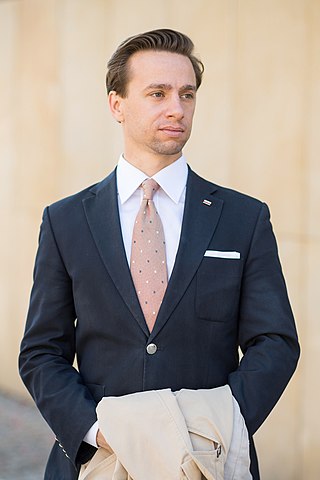
Krzysztof Bosak is a far-right Polish politician. He serves as the Deputy Marshal of the Sejm of the Republic of Poland. He was a member of the Sejm for the League of Polish Families from 2005 to 2007 and has been a member of the Sejm again since 2019 for the Confederation. Bosak was the chairman of the All-Polish Youth from 2005 to 2006 and was one of the founders and the current chairman of the National Movement. He was a candidate for president in 2020.
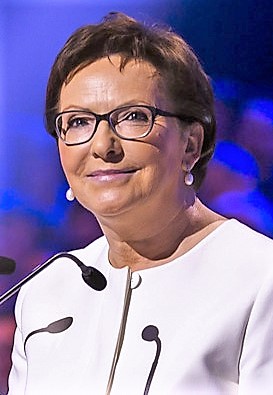
Ewa Bożena Kopacz is a Polish politician who has served as a Vice-President of the European Parliament since 2019. She previously was Marshal of the Sejm from 2011 to 2014, the first woman to hold the office, as well as Prime Minister of Poland from 2014 to 2015. In addition, Kopacz was Minister of Health from 2007 until 2011. Since 2001, she has been a member of Civic Platform, which she chaired from 2014 to 2016. Kopacz succeeded Donald Tusk as prime minister, becoming the second woman to hold the office after Hanna Suchocka (1992–1993). Her term as prime minister ended on 16 November 2015, when she was succeeded by Beata Szydło.

Marek Wacław Sawicki is a Polish politician who has been serving as a member of the Sejm since 1993. He also served as Minister of Agriculture and Rural Development on two occasions.
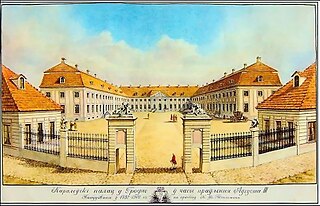
Grodno Sejm was the last Sejm of the Polish–Lithuanian Commonwealth. The Grodno Sejm, held in autumn 1793 in Grodno, Grand Duchy of Lithuania is infamous because its deputies, bribed or coerced by the Russian Empire, passed the act of Second Partition of Poland. The Sejm started on 17 June and ended on 23 November 1793. It ratified the division of the country in a futile attempt to prevent its subsequent complete annexation two years later in the 1795 Third Partition of Poland.

Silesian Parliament or Silesian Sejm was the governing body of the Silesian Voivodeship (1920–1939), an autonomous voivodeship of the Second Polish Republic between 1920 and 1945. It was elected in democratic elections and had certain influence over the usage of taxes collected in Silesia. It consisted of 48 deputies.
The Senior Marshal is an honorary post in Sejm or the Senate given to one of the oldest members of the body.
Franciszek Ksawery Chomiński was a Polish soldier, politician, translator and poet. Sejm deputy, deputy to the Lithuanian Tribunal and voivode of Mscislaw from 1788 in the Polish–Lithuanian Commonwealth, and marshal of the Grodno Governorate in the Russian Empire after partitions of Poland.
The Sejm of the Grand Duchy of Posen was the parliament in the 19th century Grand Duchy of Posen and the Province of Posen, seated in Poznań/Posen. It existed from 1823 to 1918. In the history of the Polish parliament, it succeeded the general sejm and local sejmik on part of the territories of the Prussian partition. Originally retaining a Polish character, it acquired a more German character in the second half of the 19th century.
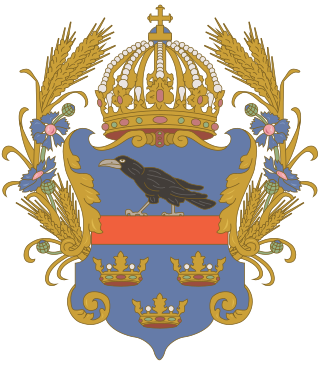
The Diet of the Kingdom of Galicia and Lodomeria, and of the Grand Duchy of Cracow was the regional assembly of the Kingdom of Galicia and Lodomeria, a crown land of the Austrian Empire, and later Austria-Hungary. In the history of the Polish parliaments, it is considered the successor of the former sejm walny, or general sejm of the Kingdom of Poland and the Polish–Lithuanian Commonwealth, and also of the sejmik, or local councils, in the territories of the Austrian Partition. It existed from 1861 until the dissolution of Austria-Hungary in 1918.
The Legislative Sejm of the Second Polish Republic was the first national parliament (Sejm) of the newly independent Second Polish Republic. It was elected in the 1919 Polish legislative election.
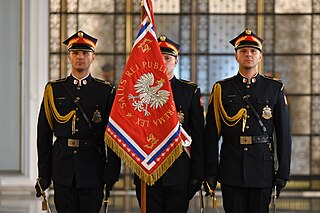
The Marshal Guard is a security unit that serves as the protection of the Marshal of the Sejm of the Polish Parliament. It also ensures that the order is maintained in parliament and that parliamentarians have a calm environment to work in. Besides its security role, it also participates in ceremonial military parades and official anniversary celebrations.

Piotr Borys is a Polish politician, who has served as a local government official, member of the board and deputy marshal of the Lower Silesian Voivodeship, as Member of the Seventh European Parliament, and as member of the 9th Sejm.
The year of 2021 is declared the Year of Stanisław Lem in Poland, according to the November 27, 2020 resolution of Sejm. It assigned several patrons for the year, so 2021 is to be known as the Stanisław Lem Year, Stefan Wyszyński Year, Cyprian Norwid Year, Krzysztof Kamil Baczyński Year, Tadeusz Różewicz Year, as well as the Constitution of 3 May Year in Poland. 2021 is the year of the 100th Stanisław Lem anniversary.